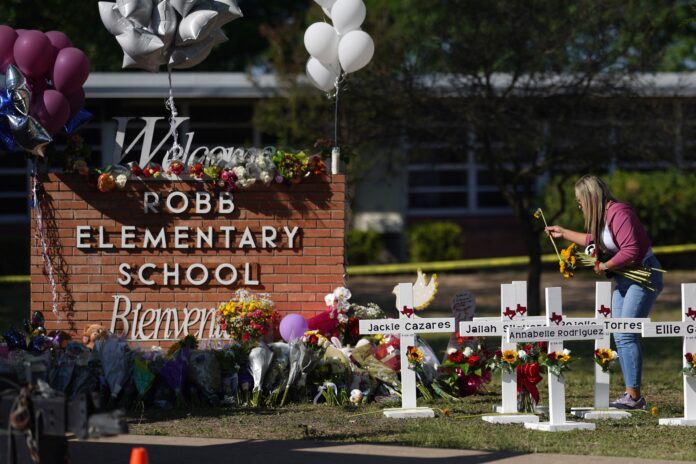Thirty-one people.
That’s how many have died in two weeks in two separate mass shootings in the United States — first at a Buffalo supermarket on May 14, and then at a Texas elementary school on May 24.
Not only do mass trauma events weigh heavily on those involved, but observers nearby and abroad can feel the effects too, experts say.
With mass shooting fatalities on the rise, according to a recent study, it’s important those who consume the news take time to care for their mental health, said Steve Joordens, professor of psychology at the University of Toronto in Scarborough.
“One impact of this all is it makes us all feel like the world is more dangerous than it was, and that’s not a good feeling,” he told Global News.
“It’s hard on a lot of our mental health. It’s harder to kind of see life and the world as a pleasant place when we’re continually bombarded with all the ugliness of it.”
Texas school shooting puts Sandy Hook tragedy, fight for U.S. gun control back in focus
The slayings of 19 children and two teachers at Robb Elementary School in Uvlade, Texas, sent shockwaves throughout the United States and abroad. It came on the heels of a mass shooting in Buffalo, N.Y., when a racist, hate-filled shooter killed 10 Black people at a grocery store.
The back-to-back massacres are a reminder of the frequency of mass gun violence in the U.S. — and a February study suggested they are becoming more deadly.
The Violence Project examined 172 mass shootings — defined as killing four or more people — dating back more than 50 years in the United States.
It found that of all the mass shootings that took place between 1966 and 2019, more than half happened since 2000, with 20 per cent of them occurring between 2010 and 2019.
In the last five years of the study period, roughly 51 people died on average from mass shootings per year, compared with only eight people in the 1970s.
When mass shootings in the U.S. occur, international observers could see them as an “American problem,” Joordens said, but they can trigger reminders of mass trauma events in their homelands.
Trending Stories
Everything we know so far about the Texas mass school shooting
Ray Liotta dead: ‘Goodfellas’ actor dies at 67
In the last few years, Canada has seen several mass trauma events that led to many deaths.
In 2018, a man driving a rented van mowed down pedestrians on Toronto’s busy Yonge Street, killing 11 and injuring 15 others. Over two days in 2020, a man went on a shooting rampage in Nova Scotia, killing 22 people in the worst mass shooting in modern Canadian history.
Though these two recent events happened abroad, it no longer feels like an American problem to some degree, Joordens said.
“Even though we still probably think something like a mass school shooting is still more likely in the States than Canada, we know the idea of somebody who is indoctrinated and feels upset and angry and has decided to take it out on other human beings – that can happen anywhere,” he said.
“When we see these things, they are reminders; they bring back to mind the incidents that happened here. That does kind of feed into our security. There used to be this nice wall of ‘there not here,’ and now I don’t think we all believe that.”
When mass trauma events occur, observers have to focus on their current moment and know in that time that they are safe, said Mel Borins, associate professor with the Temerty Faculty of Medicine at the University of Toronto.
Thinking about the future in a negative way is not helpful, he added.
“In order to stay relaxed, I need to focus on this moment and believe right now at this time, I feel safe,” Borins said.
When events like the shootings in Texas and Buffalo happen, they become huge news everywhere that becomes hard to avoid, which could make someone feel those events are more likely to happen than they are, Joordens said.
“We can tell ourselves that rationally, but again it’s an emotional reaction when we watch the news and when we see those parents, and especially when we hear their mournful comments afterwards (because) as humans, we feel that, and that brings us right to the fear and that will short-circuit any sort of rational thought we have,” he said.
“There’s so much ugliness in the world. We have to almost intentionally orient ourselves more towards the beauty that’s there and the good that’s there and really try to spend some time appreciating that.”
Difficult conversations about school shooting
In times like this, observers should try to spend more time with things or people who make them feel good, be it with a group of close friends, listening to a playlist with songs filled from high school days, reading comics or watching comedies, Joordens and Borins said.
“We need that feeling of great win. It’s like a counterforce to the negative hormones that are released when we’re stressed all the time,” Joordens said.
“The negative stuff will find its way to our mind, it always does. We kind of have to help the positive stuff get there as well every now and then.”
— with files from The Associated Press and Reuters
© 2022 Global News, a division of Corus Entertainment Inc.



